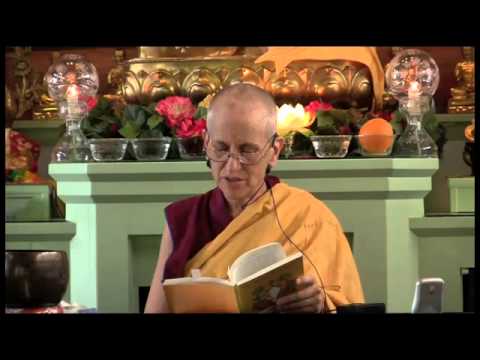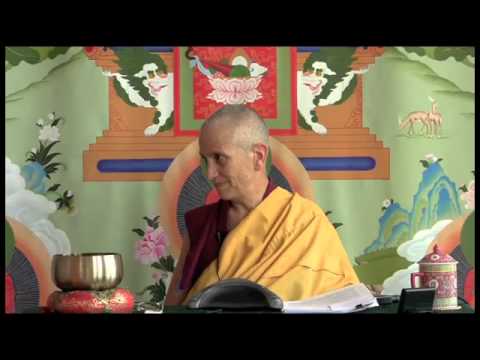What to do when dying
A talk from the Bodhisattva Breakfast Corner series.
So some people in the SAFE course had a question about what to do when dying, given that we have the opportunity to really utilize our mind. It’s a very important topic to talk about. There are more resources if people go to thubtenchodron.org, and then there’s a whole section about health and death and dying. There’s a lot of information on there, but basically the most important thing to do when you realize you’re dying is to let go of this life and not cling on to anything in this life because that clinging is useless because we can’t take anything with us. We’re separating from everything. So to really, in your mind, deliberately give everything away. I give my possessions away. I give my body away. I give my friends and relatives away. I give my whole ego status, popularity, reputation away. And you come back to what’s really important, which is your refuge in the three jewels and your motivation of love and compassion and bodhicitta.
Without clinging to anything and without having an idea of, “I’ve got to look really good while I’m dying.” Because some people they have this idea or not even, “I have to look good, my face has to look good, but I have to die in the right way otherwise I mean, my reputation is at stake if I don’t die in the right way.” And people worry about, “What’s going to happen to my body after I die, and what’s going to happen to my wealth, and what’s going to happen to my family?” All this kind of worry over things that there’s no sense worrying about because we can’t control them.
So the best thing to do is just mentally relinquish everything and then take refuge in the Buddha, Dharma, and Sangha and generate our motivation of love and compassion or bodhicitta and go forward with a wish, first dedicating the merit from this life, “Whatever merit I’ve created, I dedicate for sentient beings, and now as I go forth, may I be born in a place and body and a circumstance where I can be of the greatest benefit to sentient beings. May I be able to meet fully qualified Mahayana and Vajrayana teachers, and not only meet them, but may I have the sense, after meeting fully qualified teachers, to follow their instructions and form a good relationship with them. So I take refuge in the Buddha, Dharma and Sangha, and I go forward with bodhicitta. I dedicate my previous life for the benefit of others as I go forth from now until enlightenment. May I always have the bodhicitta mind in me and meet people who can teach me about bodhicitta, and meet people around me who will support me in developing bodhicitta.”
Then just let go and be peaceful, and remember whatever appearances I see, are only appearances, so there’s no sense grasping at them. Sometimes if you see strange colors or weird appearances or frightful things, they’re just appearances to the mind. They’re not real, and so to remember that. “Oh, just appearances, I don’t need to grasp on to any of them.” Generate your bodhicitta and go forward. That’s the brief instruction.
You might also want to try and say goodbye to everybody beforehand so that you can be peaceful when you’re dying without your family around you or friends around you crying or holding your hand or doing things like that, but just arrange it so you can be peaceful and quiet and take refuge and bodhicitta and guide your own mind and enjoy. Yes? Of course, to die well, we have to live well. That means abandoning negativities while we’re alive and creating a lot of virtue while we are alive. That’s a daily practice for us to do.
Venerable Thubten Chodron
Venerable Chodron emphasizes the practical application of Buddha’s teachings in our daily lives and is especially skilled at explaining them in ways easily understood and practiced by Westerners. She is well known for her warm, humorous, and lucid teachings. She was ordained as a Buddhist nun in 1977 by Kyabje Ling Rinpoche in Dharamsala, India, and in 1986 she received bhikshuni (full) ordination in Taiwan. Read her full bio.


